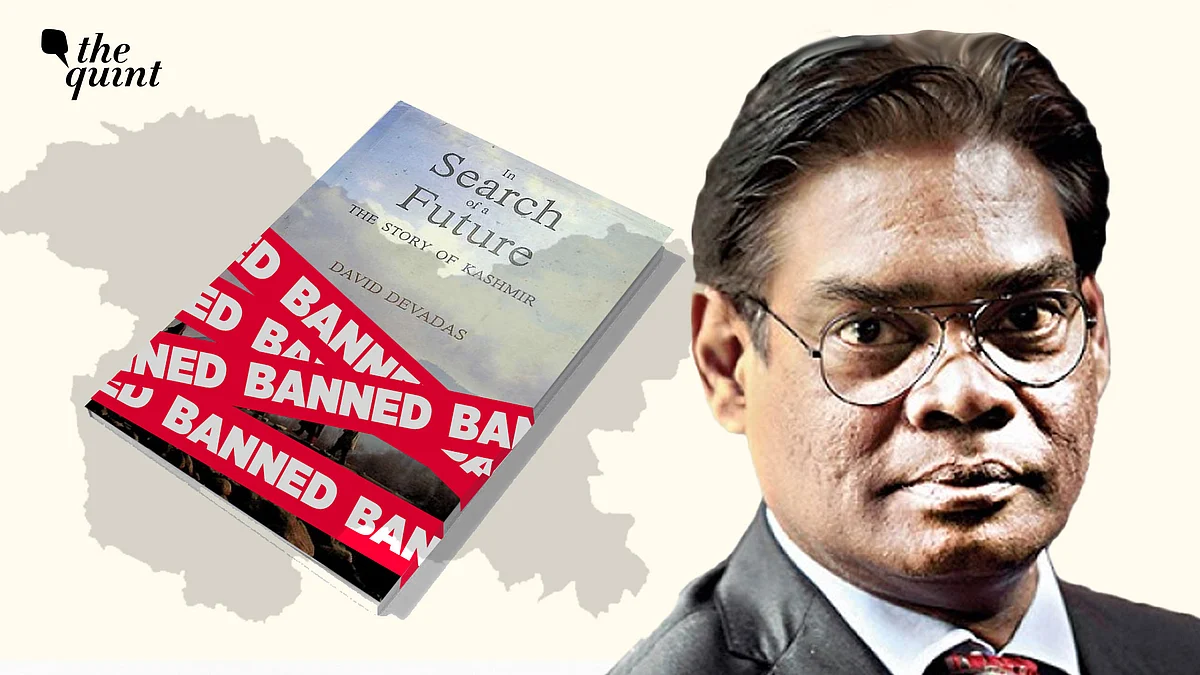
Has My Book Been Banned in Kashmir for Promoting Peace?
The fact is that banning books goes against the grain of democracy and the Constitution, writes David Devadas.

advertisement
My first book on Kashmir, 'In Search of a Future,' was published in 2007. It strongly backed the peace the former Prime Minister Atal Bihari Vajpayee had brought about after back-breaking efforts.
On 6 January 2004, he signed a deal with the former Pakistani President General Pervez Musharraf, and negotiated a free trade agreement and much closer cooperation across South Asia.
I did not know at the time that huge efforts were underway to undo that peace, and to revive insurgency—later militancy too.
Peace, War, and Books
Militancy was all but over, with its remnants limited to four pockets: Lolab, Tral, Shopian, and Kokernag. Yet, in 2006, Yasin Malik was allowed to wind his way through south Kashmir on a so-called 'safr-e-Azadi'. Books and documentaries promoting 'azadi' were prepared, and a new cohort of journalists was trained to frame narratives in exclusivist terms.
Nevertheless, those who read it were full of praise, remarking that it was balanced and gave a 360-degree account of what had happened in and about the Kashmir Valley, mainly from 1931 onward, even including a chapter about Kashmir’s history before 1931.
It remained in demand even after it was out of print, to the extent that second-hand copies were sold for Rs 30,000 and even Rs 90,000 on Amazon. It opened the eyes of some readers to the nefarious conflict industry, which has a huge stake in the continuation of violence and conflict in Kashmir.
Now, the government of the union territory of Jammu and Kashmir has seen fit to ban the book, even though it has been out of print and not available for many years.
The tragic fact is that banning books goes against the grain of democracy and the Constitution. History has shown time and time again that book-burning and book-banning constrict the growth of civilisations over the long term.
Foregrounding Foreign Agenda in Kashmir
My book brought out the nefarious role of the British in destabilising three successive maharajahs of Jammu and Kashmir and in turning India’s request to the United Nations Security Council (asking the UNSC to get Pakistan to withdraw its personnel from the state) into an arbitration issue.
It has become obvious to me that Kashmir has been turned into a major crucible to push forward the "clash of civilisations" agenda. Any work, such as my book, which seeks to promote peace and expose efforts to promote conflict undermines this "clash of civilisations" agenda.
Let us be clear: that agenda weakens countries like India, as well as its neighbours, and prevents south Asia from uniting to form a strong front against antagonistic powers to the east and the west. My work has been animated by a commitment to tell the truth in the interests of unity within the country and in its neighbourhood.
It was the first book to document General Zia-ul Haq’s instructions to Kashmiri militants at the beginning of the long spell of violence and devastation.
It also documented the meetings that Syed Ali Shah Geelani held in Kathmandu in January 1990 with ISI officers and senior figures of the Jamaat-e-Islami (JeI) organisation in Pakistan. That was when JeI cadres in Kashmir took charge of the militancy under the overall direction of Geelani.
The part of the book which presented his life story has been lauded for bringing out the methods of indoctrination, training, and underground activity, and the various misconceptions about other religious communities which feed into the "clash of civilisations" agenda in the minds of such figures.
All Encompassing but Impartial
Indeed, what is striking about the government’s choice of books to ban is that several academic and analytical books have been listed, while some polemical or propagandist work that actually motivated an entire generation of Kashmiri youth to pelt stones and agitate against the state (in 2008, 2010, and 2016) have not been banned.
The thrust of their arguments is that my book promotes peace, not anti-national sentiments. But for some odd reason, even the promotion of peace is not acceptable to some today.
(The writer is the author of ‘The Story of Kashmir’ and ‘The Generation of Rage in Kashmir’. He can be reached at @david_devadas. This is an opinion piece and the views expressed above are the author’s own. The Quint neither endorses nor is responsible for the same.)
- Access to all paywalled content on site
- Ad-free experience across The Quint
- Early previews of our Special Projects
Published: undefined